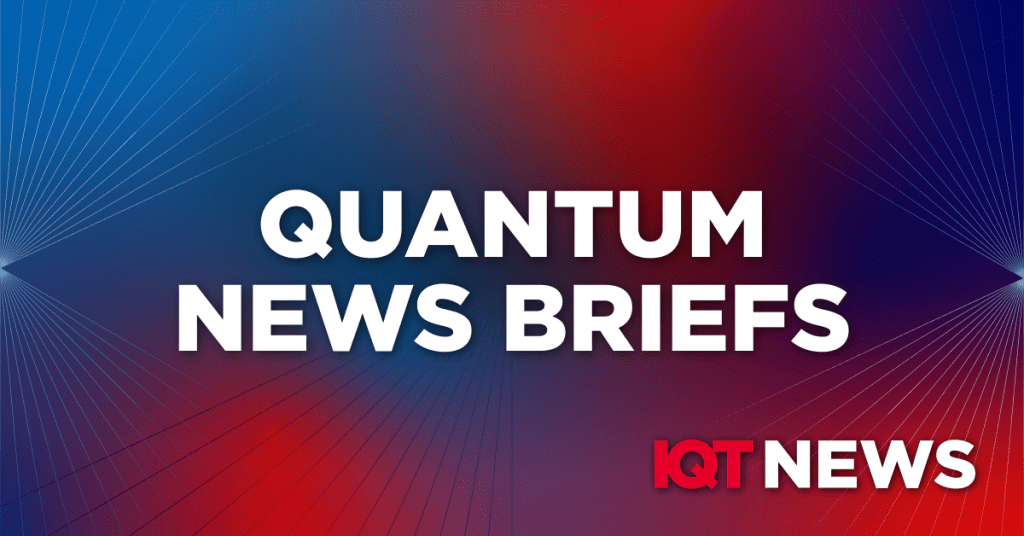News Releases:
Quantinuum Nexus beta now available for simplifying quantum workflows
Nexus was developed by Quantinuum’s in-house quantum experts to streamline the deployment of quantum algorithms. From tackling common tasks like installing packages and libraries to addressing pain points like setting up storage, Nexus seamlessly integrates thoughtful details to enhance user experience.
Nexus allows users to run, track, and manage resources across multiple quantum backends, making it easier for researchers to directly compare results and processes when using Quantinuum’s H-Series hardware or other providers. Additionally, Nexus features a cloud-hosted and preconfigured JupyterHub environment and dedicated simulators – most notably, the Quantinuum H-Series emulator.
BTQ and ID Quantique sign MOU: Collaboration for Developing Next-Generation Authentication Systems
BTQ and ID Quantique (IDQ) have signed a Memorandum of Understanding (MOU) for joint research, development, and mutual cooperation to create an innovative authentication system combining Quantum Random Number Generators (QRNG) and Post-Quantum Cryptography (PQC). Through this agreement, the two companies expect to pioneer a new authentication system market based on QRNG and PQC quantum technologies as per July 31 news release.
IDQ is a leading company in the field of quantum cryptography and was the first in the world to commercialize quantum random number generators. IDQ also showcases outstanding technology in QKD (Quantum Key Distribution) and SNSPD (Superconducting Nanowire Single Photon Detectors).
BTQ, a Canadian-listed company, developed the PQC quantum signature algorithm
In Other News:
IEEE Spectrum reports”Getting quantum and classical hardware to coexist takes deft engineering”
Quantum processors are expected to massively outperform classical ones on certain problems, but for many computing tasks they offer little advantage. That’s leading to a growing focus on hybrid computing systems that could combine the best of both approaches. But getting such different technologies to work together smoothly is challenging reports Edd Gent in July 20 IEEE Spectrum and summarized here by IQT News.
While most co-processors are built using the same technology and operate in fundamentally similar ways, quantum processors rely on a completely different computing paradigm. There are also a dizzying array of hardware choices, including superconducting circuits, ion-traps, and neutral atoms. Efforts to merge these technologies with classical computers have mainly been underway in the laboratories of quantum computing companies. But lately, customers increasingly want to integrate quantum processors into their own data centers or HPC facilities, opening up new engineering challenges.
So far, most quantum hardware companies have provided cloud access to their devices. But in the last couple of years, major players have announced deals to install their machines at data centers, supercomputing centers and national laboratories.
Quantum computers are very different from the hardware these facilities normally deal with. Quantum processors are expected to massively outperform classical ones on certain problems, but for many computing tasks they offer little advantage. That’s leading to a growing focus on hybrid computing systems that could combine the best of both approaches. But getting such different technologies to work together smoothly is challenging. Quantum hardware struggles in a noisy data center, doesn’t naturally fit in with software architecture, and there is a technical language barrier between quantum and classical computing engineers. Combining processors that excel at different tasks is a well-established idea.
But while most co-processors are built using the same CMOS technology and operate in fundamentally similar ways, quantum processors rely on a completely different computing paradigm. There are also a dizzying array of hardware choices, including superconducting circuits, ion-traps, and neutral atoms. Lately, customers increasingly want to integrate quantum processors into their own data centers or HPC facilities, opening up new engineering challenges.
So far, most quantum hardware companies have provided cloud access to their devices. But in the last couple of years, major players have announced deals to install their machines at data centers, supercomputing centers and national laboratories.
However, quantum computers are very different from the hardware these facilities normally deal with. The fragile quantum states these devices rely on pose a particular challenges. Early quantum computers were built in laboratories where it was possible to control things like vibration, noise and electromagnetic interference. Data centers, in contrast, are full of loud cooling fans and rogue electromagnetic radiation caused by high power electronics. Click here to read complete article on always-excellent IEEE Spectrum.
